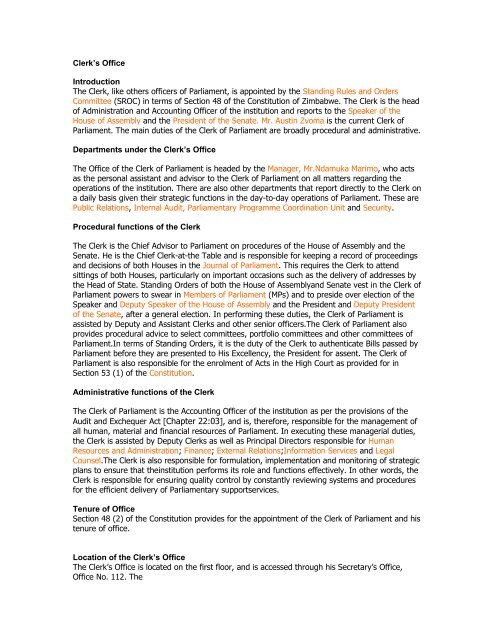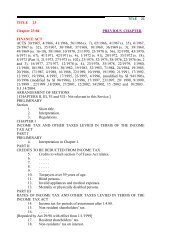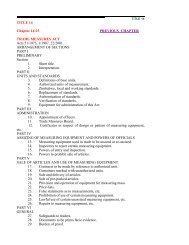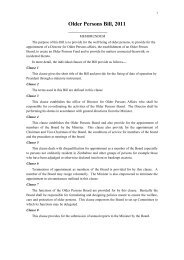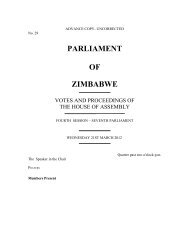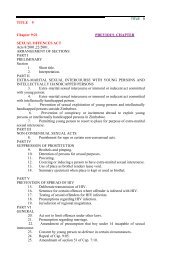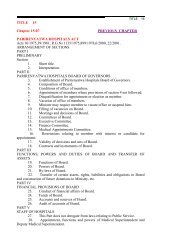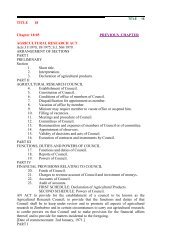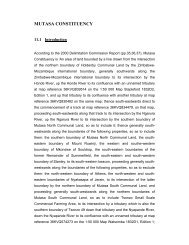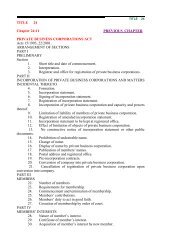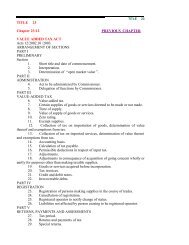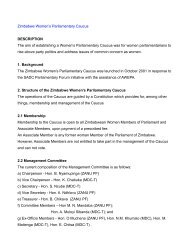Clerk's Office - Parliament of Zimbabwe
Clerk's Office - Parliament of Zimbabwe
Clerk's Office - Parliament of Zimbabwe
You also want an ePaper? Increase the reach of your titles
YUMPU automatically turns print PDFs into web optimized ePapers that Google loves.
Clerk’s <strong>Office</strong><br />
Introduction<br />
The Clerk, like others <strong>of</strong>ficers <strong>of</strong> <strong>Parliament</strong>, is appointed by the Standing Rules and Orders<br />
Committee (SROC) in terms <strong>of</strong> Section 48 <strong>of</strong> the Constitution <strong>of</strong> <strong>Zimbabwe</strong>. The Clerk is the head<br />
<strong>of</strong> Administration and Accounting <strong>Office</strong>r <strong>of</strong> the institution and reports to the Speaker <strong>of</strong> the<br />
House <strong>of</strong> Assembly and the President <strong>of</strong> the Senate. Mr. Austin Zvoma is the current Clerk <strong>of</strong><br />
<strong>Parliament</strong>. The main duties <strong>of</strong> the Clerk <strong>of</strong> <strong>Parliament</strong> are broadly procedural and administrative.<br />
Departments under the Clerk’s <strong>Office</strong><br />
The <strong>Office</strong> <strong>of</strong> the Clerk <strong>of</strong> <strong>Parliament</strong> is headed by the Manager, Mr.Ndamuka Marimo, who acts<br />
as the personal assistant and advisor to the Clerk <strong>of</strong> <strong>Parliament</strong> on all matters regarding the<br />
operations <strong>of</strong> the institution. There are also other departments that report directly to the Clerk on<br />
a daily basis given their strategic functions in the day-to-day operations <strong>of</strong> <strong>Parliament</strong>. These are<br />
Public Relations, Internal Audit, <strong>Parliament</strong>ary Programme Coordination Unit and Security.<br />
Procedural functions <strong>of</strong> the Clerk<br />
The Clerk is the Chief Advisor to <strong>Parliament</strong> on procedures <strong>of</strong> the House <strong>of</strong> Assembly and the<br />
Senate. He is the Chief Clerk-at-the Table and is responsible for keeping a record <strong>of</strong> proceedings<br />
and decisions <strong>of</strong> both Houses in the Journal <strong>of</strong> <strong>Parliament</strong>. This requires the Clerk to attend<br />
sittings <strong>of</strong> both Houses, particularly on important occasions such as the delivery <strong>of</strong> addresses by<br />
the Head <strong>of</strong> State. Standing Orders <strong>of</strong> both the House <strong>of</strong> Assemblyand Senate vest in the Clerk <strong>of</strong><br />
<strong>Parliament</strong> powers to swear in Members <strong>of</strong> <strong>Parliament</strong> (MPs) and to preside over election <strong>of</strong> the<br />
Speaker and Deputy Speaker <strong>of</strong> the House <strong>of</strong> Assembly and the President and Deputy President<br />
<strong>of</strong> the Senate, after a general election. In performing these duties, the Clerk <strong>of</strong> <strong>Parliament</strong> is<br />
assisted by Deputy and Assistant Clerks and other senior <strong>of</strong>ficers.The Clerk <strong>of</strong> <strong>Parliament</strong> also<br />
provides procedural advice to select committees, portfolio committees and other committees <strong>of</strong><br />
<strong>Parliament</strong>.In terms <strong>of</strong> Standing Orders, it is the duty <strong>of</strong> the Clerk to authenticate Bills passed by<br />
<strong>Parliament</strong> before they are presented to His Excellency, the President for assent. The Clerk <strong>of</strong><br />
<strong>Parliament</strong> is also responsible for the enrolment <strong>of</strong> Acts in the High Court as provided for in<br />
Section 53 (1) <strong>of</strong> the Constitution.<br />
Administrative functions <strong>of</strong> the Clerk<br />
The Clerk <strong>of</strong> <strong>Parliament</strong> is the Accounting <strong>Office</strong>r <strong>of</strong> the institution as per the provisions <strong>of</strong> the<br />
Audit and Exchequer Act [Chapter 22:03], and is, therefore, responsible for the management <strong>of</strong><br />
all human, material and financial resources <strong>of</strong> <strong>Parliament</strong>. In executing these managerial duties,<br />
the Clerk is assisted by Deputy Clerks as well as Principal Directors responsible for Human<br />
Resources and Administration; Finance; External Relations;Information Services and Legal<br />
Counsel.The Clerk is also responsible for formulation, implementation and monitoring <strong>of</strong> strategic<br />
plans to ensure that theinstitution performs its role and functions effectively. In other words, the<br />
Clerk is responsible for ensuring quality control by constantly reviewing systems and procedures<br />
for the efficient delivery <strong>of</strong> <strong>Parliament</strong>ary supportservices.<br />
Tenure <strong>of</strong> <strong>Office</strong><br />
Section 48 (2) <strong>of</strong> the Constitution provides for the appointment <strong>of</strong> the Clerk <strong>of</strong> <strong>Parliament</strong> and his<br />
tenure <strong>of</strong> <strong>of</strong>fice.<br />
Location <strong>of</strong> the Clerk’s <strong>Office</strong><br />
The Clerk’s <strong>Office</strong> is located on the first floor, and is accessed through his Secretary’s <strong>Office</strong>,<br />
<strong>Office</strong> No. 112. The
<strong>of</strong>fice <strong>of</strong> the Manager-<strong>Office</strong> <strong>of</strong> the Clerk <strong>of</strong> <strong>Parliament</strong>, who is available to assist MPs and<br />
other stakeholders, is also located on the first floor, <strong>Office</strong> No. 163.


